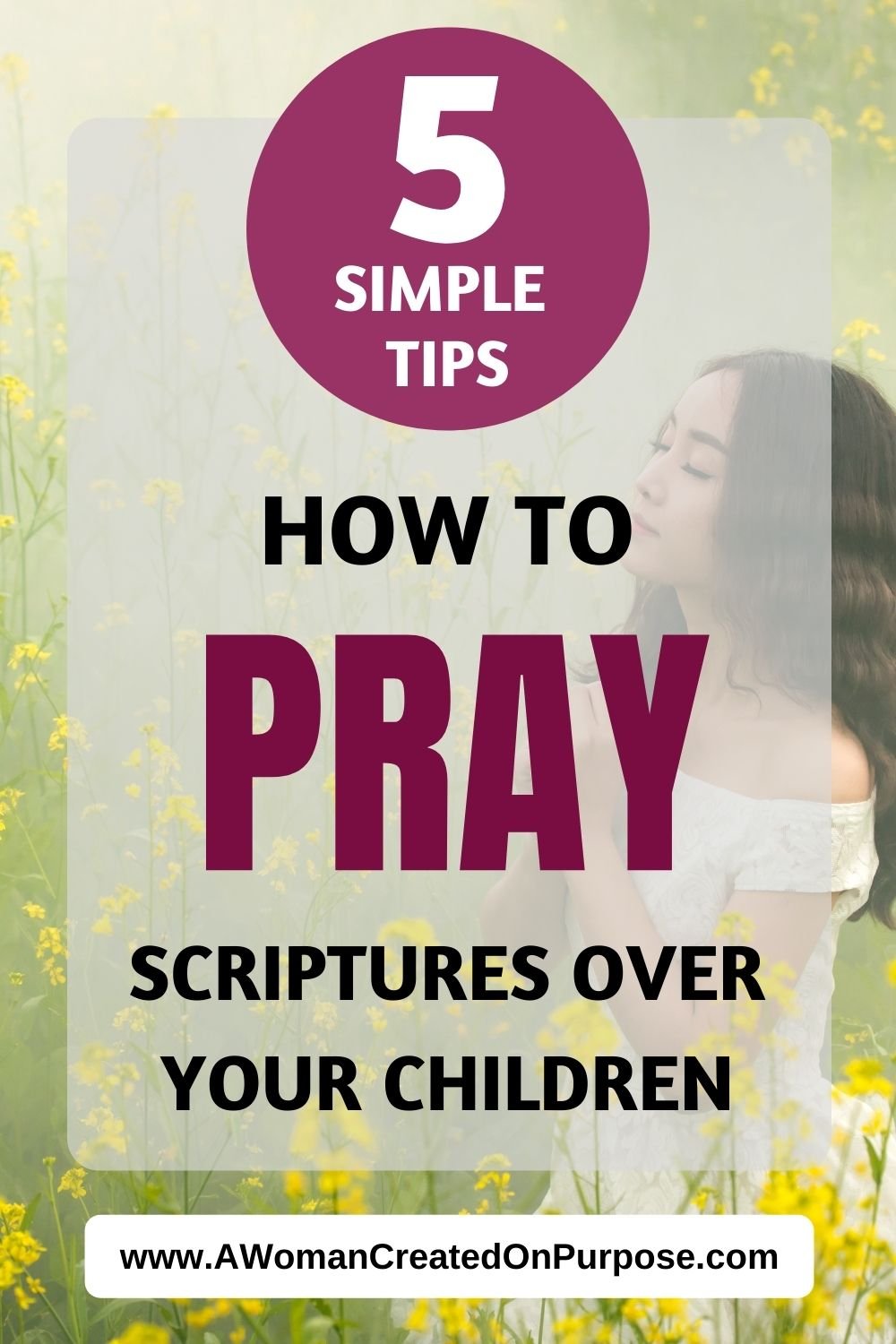How to Purposely Pray Over Your Children
Prayer is one of the most beautiful parts of our relationship with Christ that we get to enjoy. I mean, think about it– at any point, on any given day, and at absolutely any time, we can have a conversation with the Almighty God. The same God who created the universe (Genesis 1:1). The same God who knit you together in your mother’s womb (Psalm 139:13). The same God who sent His only Son to die so that you could be made right in His eyes, and yes– have a complete, VIP, all-access pass straight into His throne room (Ephesians 2:18).
But sometimes we can take this for granted.
At times, our prayers are weak, quick, or just a thing we check off our to-do list. Sometimes we tell a sister, “I’ll pray for you,” yet the prayer request gets lost in the heaviness of our own day. We have every intention to spend ample time communing with the Lord, but things “get in our way,” or “take up our time,” compressing our prayer life into a simple, “Please, thank you, Jesus. Amen.”
I pray (no pun intended) I’m not alone in this.
Regardless, we know prayer is important. It’s important in all aspects of our lives, but as mothers– it’s especially important in the lives of our children. A wise sister has often said to me, “Who else is going to pray for your children more than you?”
Since my children were very little, I’ve prayed specific blessings and Scriptures over them. I’ll share them in a bit.
But first, let’s stop and really think about our approach to prayer and why it’s important.
What is prayer?
Prayer is communication with God. Talking to Him, crying out to Him, praising Him, or petitioning Him– whether aloud or from the depths of our heart– all constitute prayer. When we pray, we have the opportunity to bear our soul before our Heavenly Father. Although He is omniscient, searches our hearts, and knows every intent of our thoughts (1 Chronicles 28:9), He still desires that we bring everything to Him.
Like any good father, He wants to hear from us regularly. He wants to know our pains, struggles, and greatest joys. He is faithful, and therefore we can always approach Him with thanksgiving.
Our prayers may not always be answered in the way that we think, but they are never for naught. They allow us to draw near to the Lord, and there is always much to learn as we humbly approach Him, trusting in His perfect will.
But, prayer isn't just about us speaking to God-- it also involves Him speaking with us. Oftentimes, it is better to simply be still and listen to what He has to say, as opposed to doing all of the talking.
What we learn from Nehemiah about prayer
The first chapter of the Old Testament book of Nehemiah begins with a powerful prayer, spoken by Nehemiah himself. At the time, Nehemiah was serving as cupbearer to the king in Susa (Nehemiah 1:11), and he received a bad report regarding the Jewish exiles who had returned to Jerusalem (1:3).
The news brought great distress to Nehemiah (1:4). He was distressed over the state of Jerusalem, as well as those he loved, and he took his sorrow to the Lord in prayer before doing anything else. We see this prayer beginning in verse 5 of the first chapter.
Significant elements of Nehemiah’s prayer
There are important pieces of Nehemiah’s prayer that we can implement practically in ours. Although there isn’t a specific method we need to use to pray each time, it can be helpful to keep a few things in mind as we approach the throne of grace:
Nehemiah praised the Lord first.
I said, “Please, Lord God of heaven, the great and awesome God, who keeps the covenant and faithfulness for those who love Him and keep His commandments:” (1:5 NASB)
Although his heart mourned, he didn’t hesitate to still praise the Lord for who He is. Nehemiah’s opinion of God didn’t change based on the situation at hand.
He offered up prayer for all the children of Israel, interceding on their behalf.
Let Your ear now be attentive and Your eyes open, to hear the prayer of Your servant which I am praying before You now, day and night, on behalf of the sons of Israel Your servants… (1:6)
Just as Nehemiah prayed on behalf of all the children of Israel, we as moms can (and should) intercede for our own children in prayer. This isn’t just a one-time thing. The Word calls us to be diligent in our prayers (1 Thessalonians 5:17), whether they’re for ourselves or others.
He confessed their sins, including himself and his family in the confession.
…confessing the sins of the sons of Israel which we have committed against You; I and my father’s house have sinned. We have acted very corruptly against You and have not kept the commandments, nor the statutes, nor the ordinances which You commanded Your servant Moses. (1:6-7)
Notice his use of “we” and not “they.” Many times we tend to see the wrongs and faults of our kids. Perhaps we take these things to the Lord, asking Him to change their hearts, make them more obedient, or to help them see their sin for what it is. Yet, we have to be careful to not only share the sins of our children. We also need to see our own sin in each situation and include ourselves in our confessions.
Yes, they disobeyed repeatedly, or talked back— but did you yell at your kids in the process? Did you lose self-control, or let your anger brew?
Nehemiah, although living in another land, was quick to realize that he was still a part of his people, and therefore still a part of the sins they'd committed.
He acknowledged that God kept His promises in the past. therefore, he came before the Lord with the hope that He would continue to keep His promises.
They are Your servants and Your people whom You redeemed by Your great power and by Your strong hand. Please, Lord, may Your ear be attentive to the prayer of Your servant and the prayer of Your servants who delight to revere Your name, and please make Your servant successful today and grant him mercy before this man. (1:10-11)
Think about times in your past when God was faithful. Write them down. Remember them. Often, when we’re in the thick of things, our brains tend to get foggy about our past. Making a habit of calling to remembrance what He’s done in our lives and the lives of our children helps us to be confident in the fact that He will do it again. The situation may not look the same, but His faithfulness does not change.
What makes an effective prayer?
Prayer is open, honest, raw, and genuine. The Lord wants us to bear our soul to Him, seeking His will for our lives, and coming to Him in faith.
But, prayers don’t have to be lengthy to be effective. When Nehemiah humbly went before the king to ask for permission to return to Jerusalem, the king asked him what he requested. We see at the end of verse 4, and the start of verse 5:
So I prayed to the God of heaven. (2:4) Then I said to the king… (2:5)
The text doesn’t say that Nehemiah stepped away from the king or that there was a long pause between the king’s question and Nehemiah’s response. Assumably then, this was a quick, silent prayer in comparison to the one we see in the first chapter.
Nehemiah prays silently as he is literally standing before the king.
I love this. Before answering, he prays. He could have just said whatever popped into his mind, but he inquired of the Lord before opening his mouth.
“Pray first. Speak second.”
And, if you read on, you’ll notice he asked for some very specific things from the king– letters with specific details for specific people. In verse 8, Nehemiah narrates the text, explaining that the king granted these things to him “because the good hand of my God was on me.”
The hand of God was on him because he prayed first and spoke second. His requests were able to come from a position of what the Lord wanted to happen in order to complete His plans and purposes, not from Nehemiah’s perspective and what he thought would be best.
Effective prayers seek the will of the Lord first.
Praying for your children: 5 TipS
There is no right or wrong way to pray over your children. Just do it! Bring them boldly to the Lord’s throne and lay them at His feet.
Gleaning from Nehemiah, here are a few things to keep in mind:
#1: CONSIDER THE STATE OF YOUR CHILDREN, just as Nehemiah did concerning the state of Jerusalem. What is going on in their lives? Where do they struggle? Are they feeling pressured? Living in distress? In what areas do they do well?
Some of these answers we can see, and some we may need to inquire of the Lord.
#2: TAKE THEIR “STATE” TO THE LORD. Ask the Lord to lead you to specific Scriptures you can pray over your children to battle those issues. Keep in mind that the “state of your children” changes as they grow, so this is a regular observation and reflection to be had by you as their mother.
#3: INTERCEDE FOR YOUR CHILDREN. As Nehemiah prayed for the children of Israel, you too need to intercede on your children’s behalf. If you aren’t regularly praying for your own children, who is?
#4: REMEMBER THE LORD’S FAITHFULNESS. In prayer, you can remember the Lord’s faithfulness in the past, which helps you to have hope in His faithfulness in the present. Knowing this truth keeps you from dwelling on the current struggles you face in motherhood or your children’s “state” now.
#5: DEVOTE TIME IN YOUR SCHEDULE TO PRAY. We’re busy moms, for sure. But, praying over your children is worth rearranging your schedule a bit so you can have ample time to take your cares and concerns before the Lord.
Remember His faithfulness to them in the past, and know that the good work that He started, He will complete (Philippians 1:6).
“Consider the state of your children. Where do they struggle? In what areas do they do well?”
So, sister, what do you request?
You see the distresses of our children, and as the king asked Nehemiah, “What do you request?” (Nehemiah 2:4). In the same fashion, typically you may ask yourself, What should I do?
Will you look at the situation and do what you think is best? Or, like Nehemiah, will you pray to the God of Heaven?
What would the Lord have you do? Sometimes He gives you numerous details. Sometimes He simply gives you the single next step to take.
I want the good hand of my God to be on me, especially in eternal matters– like the lives of my children.
How to pray Scriptures over your children
It sounds redundant, but sometimes you have to pray about what you should pray about. Meaning, you need to ask the Lord for deeper insight into your life and the lives of your children. When I’ve done this, He’s oftentimes led me to particular Scriptures (or lessons we can take from specific Scriptures) that I can pray.
I pray...
That my daughter would have the courage of Esther.
That she would understand pride comes before the fall (Proverbs 16:18).
That my son would have the steadfastness for the Lord, like Daniel.
That he would desire to only declare the truth (Proverbs 12:17).
That my children would grow in wisdom and stature, in favor of God and man (Luke 2:52).
That they’d find a friend like Jonathan. Jonathan and David’s relationship exemplifies honor, self-sacrifice, putting God’s plan for David ahead of self-interest, commitment, protection, and standing up for the other. (Read my guest post at Undoubted Grace about Godly Friendships!)
Each prayer has been placed on my heart for certain reasons, and it's encouraging to see various aspects of each come to fruition in different ways.
Sister, let’s be diligent to pray for our children without ceasing!
Are there specific things you’re praying over your children? Share in the comments below!








